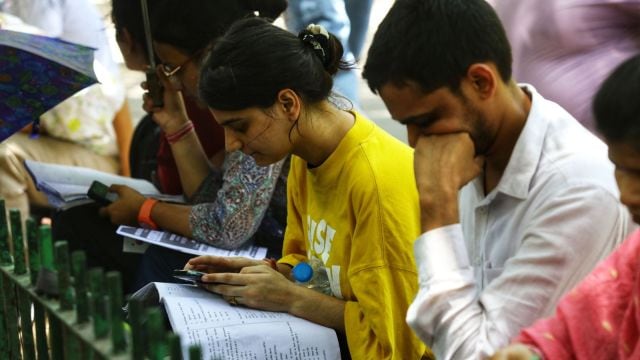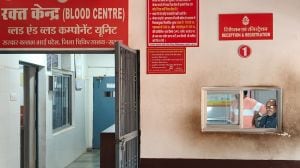With the UPSC Mains exam scheduled on September 20, aspirants are finding it difficult to move away from the recent tragedies and concentrate on cracking one of the toughest exams in the world. The recent cases of the drowning of three UPSC aspirants, death by electrocution of another aspirant, and the controversies surrounding Pooja Khedkar have kept the civil services aspirants on their toes and in emotional turmoil.
After three civil services exam aspirants drowned in a basement library of Rau’s IAS Study Circle, Delhi authorities have been quickly sealing off every underground/ basement library in Old Rajinder Nagar and Mukherjee Nagar. This, however, has negatively impacted not only the mental health of aspirants but also their preparation momentum.

‘This could have been me’
The culture of entrance examinations has gone hand-in-hand with coaching centres in India, and the recent boom in libraries in the past decade has also developed a culture of reading rooms. Due to this, aspirants of UPSC, Chartered Accountancy (CA), NEET, JEE and other entrance/ competitive exams usually sign up for a library/ reading room (which are typically nestled in basements or top floors).
This incident of three aspirants drowning, therefore, felt personal to several aspirants as the thought of “this could have been us” felt real.
Originally from Roorkee, Sagar Saini, a UPSC Mains 2024 aspirant, came to Delhi to pursue a BA (Hons) English degree from Sri Venkateswara College of Delhi University. While he graduated in 2018, he decided to stay back in the capital city and pursue UPSC after he saw one of his close friends and seniors clear the civil services exam. While he battled Covid in his hometown and was able to stay strong — mentally and physically, the drowning and death by electrocution is what has scarred Sagar for life.
“Since the tragedies, I am unable to reach that stage of concentration again. The thought of this could have been me keeps haunting me and is affecting my preparation,” shares Sagar Saini, who also used to study in one of the underground libraries of Rajinder Nagar.
Another aspirant from Madhya Pradesh, who is appearing for his first attempt in September 2024, feels that this incident has landed him in a counsellor’s office. “I had cracked JEE and went through a lot of stress while preparing for it. I lost my loved ones due to accident while I was completing my Bachelor’s degree. I have taken all this pressure at a young age but I never felt as broken as I did now. I could not get visuals from those videos out of my head for at least two days, and for the first time ever I booked an appointment with a therapist. Ironically, when my therapist asked me why I stress on online appointments, I confessed that I was too scared to even step out of my room at this point,” he said, confessing that he did not leave his second floor room for 4-5 days after the incident. “I have been using deliver apps, dabba service etc to have everything delivered, and I am studying in my room now,” he added.
Story continues below this ad
Several other candidates who returned to Old Rajinder Nagar drowning spot a few days after the tragedy have recalled getting a “scary flashback” as the repeated rains kept bringing the problem back. “I went back to ORN on August 31 when it was raining, and roads were waterlogged then too. It brought back those flashbacks and that eerie feeling,” shared Rana Rituraj, who used to study at Durga Library.
Rising rents, decreasing options
When the MCD began sealing basements, all library owners started opening their libraries/ reading rooms for 30-40 minutes every day to let students take out their books, which were in their lockers in these basements. “My books were locked in the library where I used to study. I got a call informing that they will open the room for 45 minutes, but I was too scared to go there as rain was predicted that day too. Thankfully, I had soft copies of all my notes so I started revising from that,” said the aspirant from Madhya Pradesh.
However, some students were able to retrieve their books and notes that were locked in their lockers in these basement libraries. “It gave me a post-traumatic stress disorder (PTSD) feeling, even though I was not involved in the Rau’s incident,” recalled another aspirant.
There are a few libraries in Karol Bagh, which are on the first floor, which have now allegedly increased their monthly rent. “There was a library in Karol Bagh that increased its fee from Rs 1700 to Rs 4000 immediately after the incident as they realised that basement libraries were being sealed,” shared Ankit Singh Chauhan, a UPSC aspirant.
Story continues below this ad
The aspirants are now struggling to find operating libraries in ORN and Karol Bagh. The libraries which are housed on the first floor have either increased their fee, or do not have enough seating available. “I got a floating seat, i.e. I do not have a reserved seat, but the fee has increased by 10-15 per cent,” shared another aspirant from Uttar Pradesh.
Due to the increasing flat rents and library fees, and decreasing options, some aspirants have also decided to return home to continue their UPSC CSE preparation. “Majority people live in shared accommodations here, so some people might not be able to adjust with their roommate’s schedule and might find it difficult to study in their rooms. Others got scared due to these incidents, and there are also some whose families have called them back home due to the fear of losing them. So, many students also went back to their hometown,” shared Ankit, whose roommate returned to Fatehpur.
While the Capital has gone back to its routine, UPSC aspirants in old Rajinder Nagar, Mukherjee Nagar and other areas are hoping for a real change. “Complete ban is never a solution. With this initiation of complete ban, the prices of libraries has doubled to Rs 4000 and the problem continues. Proper security measures have to be brought in place and surveillance is needed. Actual reforms are needed in these areas, and not a complete ban on libraries. We need these places to continue with the ecosystem that has been helping us and that we are habitual to now,” concluded Sagar.
































